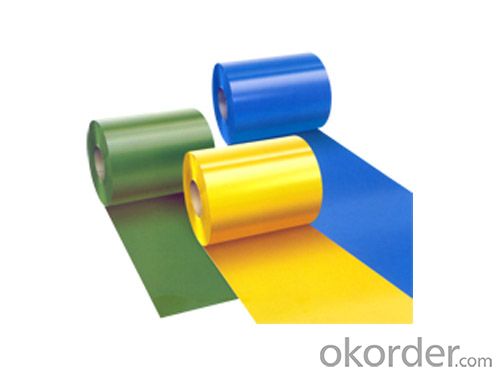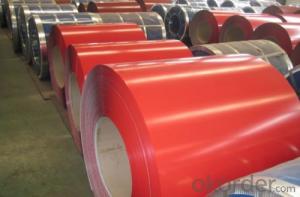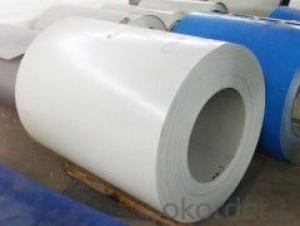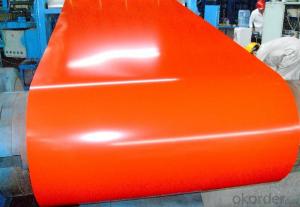PPGI Color Coated Galvanized Steel Sheet /Coil
- Loading Port:
- Shanghai
- Payment Terms:
- TT OR LC
- Min Order Qty:
- 100 m.t.
- Supply Capability:
- 10000 m.t./month
OKorder Service Pledge
OKorder Financial Service
You Might Also Like
1. Pre-Painted Galvanized/Aluzinc Steel Coil Description:
With GI as base material, after pretreatment (degrease and chemical treatment ) and liquid dope with several layers of color, then after firing and cooling, finally the plate steel is called pre-painted galvanized (aluzinc) steel. Pre-painted galvanized steel is good capable of decoration, molding, corrosion resistance. It generally displays superior workability, durability and weather resistance.
2.Main Features of the Pre-Painted Galvanized/Aluzinc Steel Coil:
• Excellent process capability
• Smooth and flat surface
• Workability, durability
• Excellent heat resistance performance
• High strength
• Good formability
• Good visual effect
3.Pre-Painted Galvanized/Aluzinc Steel Coil Images

4.Pre-Painted Galvanized/Aluzinc Steel Coil Specification
Standard: AISI, ASTM, BS, DIN, GB, JIS
Grade: DX51D, DX52D
Thickness: 0.17-2.0mm
Brand Name: KMRLON
Model Number: coil
Type: Steel Coil
Technique: Cold Rolled
Surface Treatment: Coated
Application: Boiler Plate
Special Use: High-strength Steel Plate
Width: 20-1250mm
Length: customized
commoidty: pre-painted galvanized steel coil
Thickness: 0.13-4.0mm
width: 20-1250mm
zinc coating: 40-180g/m2
printing thickness: top side: 20+/-5 microns, back side: 5-7 microns
color: all RAL color
surface treatment: color coated
coil weight: 4-7 tons
coil ID: 508/610mm
packaging: standard seaworthy packing
5.FAQ of Pre-Painted Galvanized/Aluzinc Steel Coil
1. What’s the application of this product?
Roof, roof structure, surface sheet of balcony, frame of window, etc.
2. What’s the brand of the paint?
We use the best brand of all of the word—AKZO.
3. How about your company?
A world class manufacturer & supplier of castings forging in carbon steel and alloy steel,is one of the large-scale professional investment casting production bases in China,consisting of both casting foundry forging and machining factory. Annually more than 8000 tons Precision casting and forging parts are exported to markets in Europe,America and Japan. OEM casting and forging service available according to customer’s requirements.
4. How to guarantee the quality of the products?
We have established the international advanced quality management system,every link from raw material to final product we have strict quality test;We resolutely put an end to unqualified products flowing into the market. At the same time, we will provide necessary follow-up service assurance.
5. How long can we receive the product after purchase?
Usually within thirty working days after receiving buyer’s advance payment or LC. We will arrange the factory manufacturing as soon as possible. The cargo readiness usually takes 15-25 days, but the shipment will depend on the vessel situation.
- Q:What metals contain steel? It can be anything except soft iron or steel.
- Metals do not contain steel. Steel is an alloy of purified iron and carbon, and sometimes with other metals, such as nickel, chromium, or molybdenum to make it stainless or to change its hardness or other properties. It's like asking what cereals contain Cheerios. It doesn't really make sense. Other metal alloys contain iron, which is an element and the main ingredient of steel. Maybe you should be asking which metal alloys contain iron? That's more like asking which cereals contain whole grain oats. Now that's a question that can be answered by reading the ingredients labels on your standard boxes of metal alloys :-)
- Q:What are the challenges in coil slitting for narrow strip widths?
- The challenges in coil slitting for narrow strip widths include maintaining consistent tension throughout the process, minimizing edge burrs and camber, preventing material damage or deformation, and ensuring accurate width measurements and tolerances. Additionally, handling and feeding thin strips can be more difficult, as they are more prone to wrinkling, telescoping, or jamming during the slitting operation. Overall, achieving precision and high-quality results in coil slitting for narrow strip widths requires advanced equipment, expertise, and careful attention to detail.
- Q:How are steel coils used in the production of oil and gas machinery?
- Steel coils are used in the production of oil and gas machinery to create various components, such as pipelines, storage tanks, pressure vessels, and drilling equipment. The coils are typically shaped and welded to form these structures, which provide the necessary strength and durability required for the demanding conditions of the oil and gas industry.
- Q:How do steel coils contribute to structural integrity in buildings?
- Steel coils contribute to structural integrity in buildings through their strength and durability. By using steel coils in the construction of beams, columns, and other load-bearing components, buildings can withstand heavy loads, resist deformation, and maintain their stability over time. The high tensile strength of steel coils allows for the creation of lightweight yet sturdy structures, ensuring the overall safety and longevity of the building. Additionally, steel coils offer excellent resistance to corrosion, fire, and extreme weather conditions, further enhancing the structural integrity of buildings.
- Q:7850kg/cu.m density is typical for all type of steel? like reibar, I- beam and so on
- 90% of the steels used today are plain mild carbon steels consisting of iron with less than 1% carbon content and as such have a density of about 7750 kg/cubic meter. Some special steels which have a significant percentage of alloying elements such as chrome or manganese or other elements will have greater density bringing the steel up to about 8000 kg / cubic meter. There are a greater many factors influencing the exact density of a steel. Even for steels of exactly the same content of iron , carbon and other alloying elements, there may be a difference ( very small mind you ) in density due to work hardening. The difference in this case is due to movement of dislocations which become locked in the grain boundaries and this forms a more dense crystal structure. For this same reason, the theoretical density of steel (which does not take into account dislocations) is greater than the measured density of steel.
- Q:How do steel coils contribute to acoustic performance in buildings?
- Steel coils can contribute to acoustic performance in buildings by providing a solid structure that reduces vibrations and sound transmission. The use of steel coils in construction helps dampen noise by absorbing and dissipating sound waves, resulting in a quieter and more comfortable indoor environment.
- Q:What are the common applications of steel coils?
- Steel coils have a wide range of applications, commonly used in industries such as automotive, construction, manufacturing, and appliances. They are utilized for making various products including automobiles, pipes, electrical appliances, roofing, and packaging materials.
- Q:Could someone please explain what happens when steel is heat treated and why these happenings cause the steel to become harder? Please dig down into the micro details of the crystallites but in somewhat laymen's terms. Also describe the processes which achieve these results; if you have the time. Thanks for your time and effort.
- Alright, usually whu heat you heat treat mild steel, this is because you would like it stronger than you got it. To do this you must alter the grain structure of the part or in other words, the CRYSTALLITES. Ultimately you'll end up altering the nature of the grains structure changing the tensile strength it can handle, yield strength, and even change the elongation percentage that it can tolerate under load. Heat treatment controls the rate of diffusion, and the rate of cooling within the microstructure to create these elements. Usually what they use to do this is add an element to it to make it stronger such as carbon to increase its rockwell hardness, which by the way the lower you go the harder the part can become. Heat treatment can be used in more ways than this. It can also be used to weaken the parts grain structure. This will lower the parts mechanical properties making it softer and more ductile or easier to manipulate if you have to bend it into a particular shape. Typically if you allow the part to cool after heat treatment it does go through annealing. The part will be heat treated into different stages. The first being the austenitic crystal phase which depending on how hard and strong you want it, will be at its peak. When it is cooled, it will go through a will transform to martensite which is a hard yet brittle crystalline structure. Martenised part will usually be tempered to a certain degree to improve the mechanical properties to what is needed. There is more to this and you can use the link below to read more about it.
- Q:In terms of weight to strength titanium is stronger. But is it stronger than mild steel? If it is stronger, how much stronger is it?
- The tensile strength of mild steel is about 70kpsi. Pure titanium is 60-110kpsi, and with 7% manganese it is 130-170kpsi. 1kpsi = one thousand pounds per square inch. So in other words, high grade titanium can be somewhat stronger than mild steel.
- Q:What are the different grades of steel used for manufacturing coils?
- The different grades of steel used for manufacturing coils include low carbon steel, medium carbon steel, high carbon steel, and stainless steel.
1. Manufacturer Overview |
|
|---|---|
| Location | |
| Year Established | |
| Annual Output Value | |
| Main Markets | |
| Company Certifications | |
2. Manufacturer Certificates |
|
|---|---|
| a) Certification Name | |
| Range | |
| Reference | |
| Validity Period | |
3. Manufacturer Capability |
|
|---|---|
| a)Trade Capacity | |
| Nearest Port | |
| Export Percentage | |
| No.of Employees in Trade Department | |
| Language Spoken: | |
| b)Factory Information | |
| Factory Size: | |
| No. of Production Lines | |
| Contract Manufacturing | |
| Product Price Range | |
Send your message to us
PPGI Color Coated Galvanized Steel Sheet /Coil
- Loading Port:
- Shanghai
- Payment Terms:
- TT OR LC
- Min Order Qty:
- 100 m.t.
- Supply Capability:
- 10000 m.t./month
OKorder Service Pledge
OKorder Financial Service
Similar products
New products
Hot products
Related keywords




























